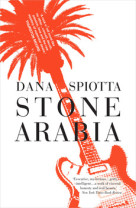The pieces I liked best in this unusual sibling tale were ponderings about memory.
Forty-something introspective, Denise, says of her father: “Inside, beyond my recall of events and dates and talk, there was this hot-wired memory of his body … Your experiences, the hard felt ones, don’t fade. They are written forever in your flesh, your nerves, your fingertips.”
Denise’s brother Nik is an ageing rock genius, self absorbed and self destructive. He’s produced a cartload of odd-sounding albums and dozens of volumes of artificial autobiography.
Denise worries about her brother obsessively and, ultimately, he confirms her fears.
“Denise wallows in a spiritual vacuum that threatens to annihilate her,” writes William Giraldi in a review published on salon.com.
But whose fault is this?
Spiotta’s novel places part of the blame on modern media which dumbs down, loves cliché, idolises celebrity and stifles individuality — pumping out inane narratives according to formula.
This makes it hard for humans to truly connect.
Spiotta shows how Denise is stuck in torpor, over-saturated with bad news and prone to lassitude — her deepest emotional moments happening vicariously.
This is not a cheery book but it is a clever one — identifying and expressing a particular LA malaise that might just apply to much of the Western World.
Did we ask for technology, media and popular culture to rob us of happiness, deep connection and spiritual integrity? How much of this stone-filled bed have we made for ourselves to lie on, remotes and other devices in hand?




Recent Comments